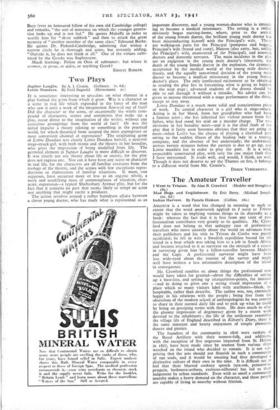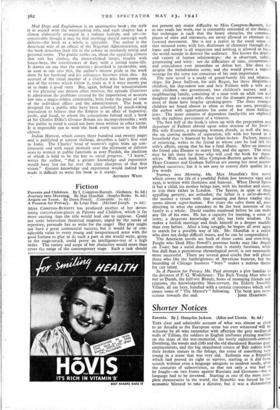The Amateur Traveller
Mad Dogs and Englishmen. By Eric Berry. (Michael Joseph. los. 6d.) Indian Harvest. By Pamela Hinksou. (Collins. 16s.)
AMATEUR is a word that has changed in meaning to such an extent that the word amateurish applied to I went to Tristan might be taken as implying various things to its discredit as a book : whereas the fact that it is free from any taint of pro- fessionalism contributes very greatly to its qualities. Mr. Craw- ford does not belong to that unhappy race of professional travellers who move uneasily about the world on advances from their publishers and his visit to Tristan da Cunha was purely accidental; he fell in with a Swedish expedition bound for the island in a boat which was taking him to a job in South Africa, and became attached to it as surveyor on the strength of a course in surveying given him by a fellow-traveller between Madeira and the Cape. A professional surveyor might have been less wide-eyed about the routine of the survey and might well have written a less informative description of the island in consequence.
Mr. Crawford rambles on about things the professional man would have taken for granted—about the difficulties of setting up a base-line, and setting Up triangulation-points, for instance —and in doing so gives one a strong visual impression of a place which so many visitors label with attributes—bleak, in- hospitable, rather than describe. The author was, too, extremely happy in his relations with the people ; being free from the obsessions of the modern school of anthropologists he was content to share in their normal daily life and to pick up what he could by being on gossiping terms with them. He does much to allay the gloomy impression of degeneracy given by .a recent work devoted to the inhabitants' the life of the settlement resembles the village life of England described in Kilvert's Diary, there is the same innocent and hearty enjoyment of simple pleasures, dances and picnics.
The founders of the community in. 1816 were rankers of the Royal Artillery with their women-folk, and additions, with the exception of five negresses imported from St. Helena in 1827, have been made since by seamen from various ships wrecked on the island who decided to remain. It is not sur- prising that the arts should not flourish in such a community of 190 souls and it would be amazing had they developed a distinctive culture of their own in the time. It is difficult not to feel that their blurred cockney speech (arx-ask, pennerwin- penguin, hashmere-asthma, eyeloose-oilhouse) has led to their judgement by urban standards. Even with so small a communitY anarchy makes a heavy demand on the character, and these people are capable of living in -anarchy without friction. Mad Dogs and Englishmen is an unattractive book ; the style is in accord with the wisecracking title, and each chapter has a climax elaborately arranged in a tedious fashion, and yet—in- conceivable though it may be that-anything should outweigh such defects—the book as a whole is agreeable. The author is the American wife of an official of the Nigerian Administration, and the book describes their life in the colony in resolutely trivial and personal terms. The prattle rattles on, about the appalling climate that rots her clothes, the insect-choked lamps, trouble with house-boys, the interferences of duty with a settled home-life. It dawns on one that the existence described is intolerable, and, as soon as one sees that, the author's intense pride in the work done by her husband and his colleagues becomes plain also. An account of the ritual murder of a chieftain who has grown old, and of the events which follow it, reads as if it were merely put in to make a good story. But, again, behind the sensationalism of the phrasing one detects other motives, the episode illustrates to admiration the problems created by the importation of western law into a magic-ridden community, both from the point of view of the individual officer and the administration. The book is designed for a public who have been schooled by muck-raking journalism to believe that the Empire is an affair of hypocrisy, profit, and fraud, to whom the conceptions behind such a book as Sir Charles Dilke's Greater Britain are incomprehensible ; with that public in mind it could not have been written in other terms. It is impossible not to wish thebook every success in the field chosen.
Indian Harvest, which covers three hundred and twenty pages and is published at sixteen shillings, describes a lady's first visit to India. The Charles' head of women's rights bobs up con- tinuously and with equal intensity over the allotment of inferior seats to women at public functions as over Purdah, the abolition of which is held to be the key to social progress. "I knew," writes the atithor, "that a greater knowledge and experience would have lost me for ever the clear sharpness of that first vision." Greater knowledge and experience would indeed have made it difficult to write the book as it stands.































 Previous page
Previous page